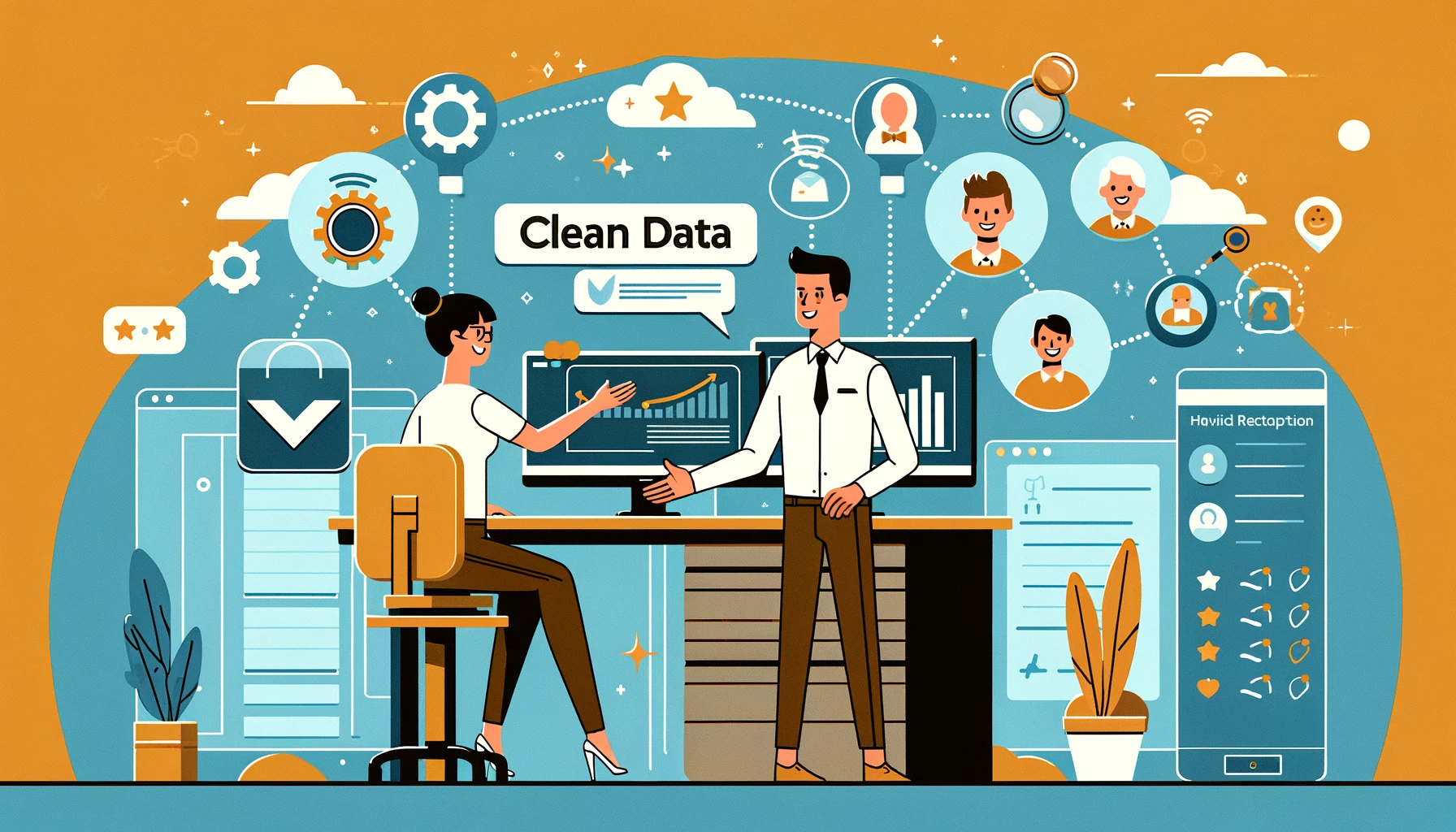Data Hygiene Essentials: Elevate Your Data Quality for Success
Unlock the secrets to pristine data with our guide on data hygiene, ensuring accuracy and boosting your business's decision-making process.
Part 1. Data Hygiene Essentials: Elevate Your Data Quality for Success
Part 2. Data Hygiene Services: Elevate Your Data Quality and Compliance
Part 3. Data Hygiene Tools: Enhance Your Data Quality and Accuracy
Part 4. Data Hygiene Best Practices: Elevate Your Data Quality Today
Part 5. What is Data Hygiene: Essential Practices for Data Quality
Unveiling the Power of Identity Resolution
In today’s digital landscape, where customer interactions are scattered across multiple platforms, the significance of identity resolution has never been more paramount. Identity resolution is more than a buzzword; it’s the cornerstone of modern marketing, enabling businesses to paint a coherent picture of their customers. By accurately identifying and connecting with real individuals, companies can transform anonymous data fragments into meaningful customer profiles.

This process involves sophisticated algorithms that utilize both deterministic and probabilistic matching techniques. Deterministic matching confirms identities with precision, using exact data points like email addresses. In contrast, probabilistic matching predicts possible matches based on patterns and behaviors, casting a wider net to capture potential customer touchpoints.
The integration of identity resolution practices ensures that marketing efforts are person-centric, not device-centric. This shift is vital for crafting personalized experiences that resonate with consumers, ultimately leading to enhanced engagement and superior advertising ROI. Moreover, it solidifies the foundation for multi-touch attribution models that reveal the true influence of each marketing channel on consumer decisions.
As data privacy continues to take center stage, adhering to stringent privacy standards and compliance regulations is non-negotiable. Data hygiene services play a crucial role here, ensuring that the identity resolution process respects consumer rights while still providing marketers with the insights needed to thrive in a competitive environment.
By embracing identity resolution, businesses unlock the potential for more meaningful connections with their audience, fostering loyalty and driving growth. The journey to achieving a unified customer view is complex, but the rewards are unequivocally worth the effort.
The Challenge of Disparate Data Sets
Navigating the labyrinth of disparate data sets presents a formidable challenge for businesses aiming to achieve a seamless customer experience. In an era where data is scattered across multiple channels, the mission to unify this fragmented information is critical. It’s a quest for a holistic customer view, essential for delivering personalized interactions and enhancing business intelligence.

The crux of the issue lies in the siloed nature of data collection. Each platform captures a sliver of customer activity, but without the threads of identity resolution, these slivers remain isolated. By leveraging advanced data hygiene services, companies can stitch together these fragments, constructing a comprehensive tapestry of customer identities. This approach not only sharpens marketing precision but also amplifies advertising ROI, as brands can now market to real people, not just devices.
At the heart of this endeavor, privacy and compliance stand as non-negotiable pillars. As businesses embark on this journey, they must navigate the waters of data protection with care, ensuring that their identity resolution strategies uphold the highest standards of consumer privacy.
By tackling the challenge of disparate data sets, companies unlock the potential for enriched customer engagements and a deeper understanding of the multifaceted paths consumers take. This understanding is the key to driving meaningful interactions and the ultimate growth of a brand.
Addressing the challenge of fragmented data is not just a technical issue; it’s a strategic imperative that can redefine the trajectory of marketing success.
Exact Match vs. Inferred Data Techniques
As we delve deeper into the realm of identity resolution, the distinction between deterministic and probabilistic matching becomes increasingly significant. Deterministic matching, or exact match, relies on specific, verifiable data points to confirm an individual’s identity. This method is akin to using a key to unlock a door; it requires precise information to make a connection.

On the other hand, probabilistic matching – the inferred data technique – uses statistical probabilities to identify potential matches. It’s like deducing the owner of a lost key by examining the patterns of wear and the places it was found. This method broadens the scope, incorporating various behavioral signals and patterns to infer customer identities across different touchpoints.
To illuminate the contrast:
| Matching Technique | Deterministic | Probabilistic |
|---|---|---|
| Basis of Match | Exact information | Behavioral data |
| Precision | High | Varies |
| Scale | Limited | Extensive |
These methodologies are not mutually exclusive; rather, they complement each other in constructing a robust identity resolution framework. By integrating both deterministic and probabilistic data, businesses can cultivate a more nuanced understanding of their customers, leading to highly personalized marketing strategies.
In the pursuit of superior advertising ROI, the synergy of exact match and inferred data techniques is paramount. It’s a balance between precision and possibility, enabling marketers to connect with real people and not just profiles. As data hygiene services continue to evolve, they remain the linchpin in ensuring the accuracy and compliance of these sophisticated matching processes, ultimately empowering brands to engage with their audience in the most resonant way.
Personalized Marketing: Beyond Device Targeting
In the pursuit of genuine engagement, the shift from device-based targeting to personalized marketing is reshaping the advertising landscape. The essence of this transformation lies in recognizing each customer as a unique individual, not just a number on a screen. With the integration of identity resolution techniques, businesses can now craft custom-tailored messages that resonate on a personal level.

This strategy hinges on the meticulous work of data hygiene services, which ensure that customer data is clean, organized, and, most importantly, unified. By addressing the intricacies of fragmented data, these services lay the groundwork for accurate customer insights, enabling brands to foster people-based engagements. The result? A significant uptick in advertising ROI as marketing becomes more efficient and impactful.
| Benefits of Personalized Marketing | Impact on Customer Engagement |
|---|---|
| Enhanced Customer Experience | Higher satisfaction and retention |
| Tailored Communication | Improved relevance and response |
| Strategic Content Delivery | Increased conversion rates |
Personalized marketing transcends traditional boundaries, allowing for a dynamic interaction with each customer across multiple touchpoints. In this context, privacy and compliance are not afterthoughts but integral components, ensuring that every engagement is respectful and consensual.
As we navigate this era of customer-centric marketing, the role of data hygiene services remains crucial. They not only maintain the integrity of identity resolution but also empower businesses to connect with their audience in the most meaningful ways. With a steadfast commitment to privacy, compliance, and sophisticated matching techniques, personalized marketing is not just a trend—it’s the future.
Maximizing Marketing Spend with Data Precision
In the digital age, where every penny counts, maximizing marketing spend through data precision has become a strategic imperative for businesses. Leveraging data hygiene services is key to refining your marketing efforts, ensuring that each campaign reaches its intended audience with pinpoint accuracy.
Through the meticulous process of identity resolution, companies can now eliminate the guesswork in their marketing strategies. This involves an intricate dance of deterministic and probabilistic matching, which together, create a unified view of the customer. Such precision not only streamlines marketing efforts but also boosts advertising ROI, as campaigns become more targeted and less wasteful.

Here’s how data hygiene services catalyze marketing efficiency:
- Cleansing Data: Removing inaccuracies and redundancies from your datasets.
- Unifying Profiles: Integrating customer information across channels for a singular view.
- Enhancing Engagement: Personalizing interactions based on accurate customer insights.
By investing in top-tier data hygiene services, you are not just cleaning data; you are setting the stage for more effective, more personal, and more compliant marketing practices. This is the future of marketing—a future where data drives decisions, and precision paves the way for success.
In this pursuit of excellence, remember that the power of marketing lies in knowing your customer. And in a world inundated with data, the clarity provided by data hygiene services is not just beneficial—it’s essential.
FAQs
What are data hygiene services?
Data hygiene services involve cleaning, organizing, and maintaining data to ensure its accuracy and usefulness.
How do data hygiene services benefit a company?
These services improve data quality, leading to better decision-making, increased efficiency, and enhanced customer targeting.
What does the process of data cleaning include?
Data cleaning typically includes deduplication, validation, correction of errors, and updating outdated information.
Can data hygiene services improve my marketing efforts?
Yes, clean and organized data allows for more targeted and effective marketing campaigns, increasing ROI.
How often should I invest in data hygiene services?
Regular data hygiene is crucial; the frequency depends on your data volume and how quickly it changes.




